
The implementation of CSR in the extractive industries in
Indonesia: What is the government’s role?
Anif Fatma Chawa
Departement of Sociology at Faculty of Social and Poitical Science, Universitas
Brawijaya, Indonesia
anif.chawa@gmail.com
Abstract. This article aims to illustrate the role of government in the implementation of CSR in
the extractive industries. The extractive industries need support from the government to resolve
various problems which have emerged in conducting their CSR. These problems have arisen
because of the contradiction and tension in the role or framework of business communities of
the extractive industries, as an economic and social agent. To address those problems, based on
a structural functional perspective, the extractive industries need other institution primarily
government to establish policies or regulations in conducting their CSR. This study employs
systemic review method reviewing 70 journal articles of research studies which focus on the
implementation of CSR in the extractive industries in Indonesia. This study found that
government has an important role to stipulate several regulations mostly at a national level. The
regulations require the extractive industries to implement CSR to specifically address various
negative impacts, socially, culturally and environmentally, on the affected communities. This
study, however, also found that there is insufficient guideline at a local level in relation to CSR.
Consequently, the extractive industries have no guidelines in how to establish their CSR
activities, to what extend they should involve the local communities as well as the local
governments in these activities and to address various problems which have emerged in the
implementation of CSR. The lack of guidelines has also given rise to the different perception of
the local governments on how they should be involved in the implementation of CSR.
Keywords. CSR, extractive industries, government
Introduction
The extractive industries have taken a ‘greedy monster’ attitude in exploiting natural
resources. They neglect social legitimacy while causing severe negative impacts on local
communities and environment. Moreover, the positive impacts of CSR (Corporate Social
Responsibility) activities in this kind of industry have been questioned. There is little evidence
that these activities have contributed to minimize negative impacts of the exploitation, let alone
addressing sustainable development issues. As a consequence, potentially local community
could not obtain maximum benefit from the extractive industries and would continuously
depend on these industries, particularly after these industries are ceased (Jenkins & Obara,
2008). Moreover, research studies also demonstrates that most of the extractive industries have
manipulated CSR initiatives and community development programs to attain practical reasons
161
Technium Social Sciences Journal
Vol. 5, 161-169, March 2020
ISSN: 2668-7798
www.techniumscience.com

including maintain a public image as good corporate citizens (Coronado & Fallon, 2010;
Ballard, 2001) and obtain social legitimacy to continue to operate (Coronado & Fallon, 2010).
The problems in the implementation of CSR have emerged due to the fact that there is
two contradictory frameworks, the production/commercial oriented framework and the
development agenda, which should be conducted by the business communities in conducting
their CSR or community development programs (Kemp, 2010). There are many research
studies which have explored the problems emerge in the implementation of CSR in extractive
industries, including oil, gas and mining industries (Ballard, 2001; Coronado & Fallon, 2010;
Frynas, 2005; Jenkins & Obara, 2008; Muller, 2006; Sarin, Reisch, Kalafut, & Slack, 2006;
Ramasastry, 2015; Kolk, 2016; Lesaffer, Ghys, Nguyen, & Rouchon, 2011). Mostly, these
studies explore particular issues including human rights, environment, ethic, the impacts on
community, and conflicts etc. These studies, however, have placed the extractive industries vis
a vis the local communities. Studies concerning on the government’s involvement in the
implementation of CSR are still scarce. Newell and Frynas (2007) stated that business
communities including mining industries acquire many supports from civil society and the state
or government in conducting CSR (Newell & Frynas, 2007). Newell and Frynas continues to
explain that the state or government should become the key actor who responsible for
determining the policies or regulations to address the complexity of the CSR or community
development programs. Based on this assumption, this study aims to explore the involvement
of the to obtain the effectiveness of the CSR or community development implementation in the
mining industry area.
Research Methods
This study employs qualitative systematic review method to fully capture the complexity
of problems and issues in the implementation of CSR by extractive industries in Indonesia.
Systemic Review is a research method to identify, evaluate, and interpret certain topics or issues
of research studies (Kitchenham, 2004). Kitchenham (2004) explained further that systemic
review is a secondary study which attempts to make synthesis of various research studies. The
result of this study potentially give equal and comprehesive facts to decision makers.
Francis and Baldesari (2006) in Siswanto (2010) stated that there are several steps to
conduct systemic review method (2006). First, formulating research question which is to what
extend government has been involved in the implementation of CSR or community
development programs in extractive industries in Indonesia. Second, conducting a systematic
literature search. In this study, secondary data was collected from seventy (70) qualitative
research studies which have been published in various journal articles which focus on the CSR
activities of extractive industries in several provinces of Indonesia. Third, screening and
selecting appropriate research articles. From seventy journal articles, this study selected articles
with qualitative method and focus on the involvement of government in CSR activities of the
extractive industries. Fourth, analyzing and synthesizing qualitative findings. Fifth,
maintaining quality control. Sixth, presenting findings.
On analyzing and synthesizing data, this study employs meta-synthesize which is
synthesize technique of data to obtain new concept and theory or to attain in depth and
comprehensive understanding (Perry & Hammond, 2002). Meta-synthesize has two approaches
which are meta-aggregation and meta-ethnography (Lewin, 2008). In particular, this study
employs meta-aggregation approach to synthesize data research by summarizing various results
studies in relation to the involvement of government in the CSR’s mining companies. In doing
so, first this study elaborates the research topic in several themes to create conceptual
framework. This study focuses on four themes including the involvement of government in the
162
Technium Social Sciences Journal
Vol. 5, 161-169, March 2020
ISSN: 2668-7798
www.techniumscience.com

CSR initiatives, the local community participation, to what extend the extractive industries have
conducted their CSR activities and the impact of these activities on the affected communities.
Then, the journal articles were collected based on these themes to be synthesized and compared.
The result of these processes is an aggregate of research studies in relation to the themes. This
study focuses more on the government’s involvement in the implementation of CSR in the
extractive industries.
Literature Review
Addressing Two Contradictions and Tension Agendas of Business Communities
Corporate Social Responsibility (CSR) is relevant to extractive industry concerning
various negative impacts of the industry upon economic, social and environment. Several
research studies have documented these effects in different countries including Russia,
Suriname, the Philippines, Ghana, and Indonesia. Access to land issues at the exploration and
mining stages, environmental degradation, conflicts between the mining companies and
communities, the destruction of local communities, and human rights violations are some of the
negative impacts which have occurred in these countries (Hilson & Murck, 2001; Ballard, 2001;
MacKay, 2002; Korsah-Brown, 2002; MacKay, 2002; Rosenthal, 2002; Martin & Newell,
2008; Yakovleva, 2005; Lesaffer, Ghys, Nguyen, & Rouchon, 2011; Kolk, 2016). Therefore,
the implementation of CSR or community development program has been assumed would
address all the negative impacts caused by mining operations.
The implementation of CSR means that business communities are expected to fulfil a
new role as a social agent in relation to their internal and external environment including the
society or communities in the local area (Wartick & Wood 1998; Wood 1994). As social agent,
business should be responsible to bring prosperity to the communities. This role is different
from the central role of business as an economic institution which is to obtain profit and increase
production. The role of business as a social agent ethically has emerged based on the issues
concerning the negative impacts of business or corporate activities on the community.
Consequently, business has expanded their involvement addressing various development
problems, such as poverty; social exclusion based on gender, race, ethnicity and class
inequality; social justice and other development challenges (Newell & Frynas 2007).
The role shifting of business communities to give more contribution on communities
have raised questions with regard to the capability or effectiveness and also the limitations of
business to conduct development programs as part of their CSR. Kemp (2010) argued that there
is contradiction and tension between two different roles or framework of business communities.
This tension has caused discrepancy of opinion among scholars. The groups, including the
United Nations (UN) and the World Bank who favor CSR believe in the positive contribution
of business to economic and human development and affirm the CSR potential to alleviate
poverty. In particular, in relation to the extractive industries which are examined in this study,
CSR or community development is still believed to be the best solution to ensure the local
community will directly benefit from these industries activities (Davidson & Braithwaite 2005).
Conversely, other groups who refuse the idea of CSR always question the capability of
business communities to reconcile two opposite objectives, both economic and social
responsibility agendas. They have criticized the implementation of CSR as unrealistic and as
purely for public relations reasons (Blowfield 2004; Kemp, D 2010; Newell & Frynas 2007).
Kemp (2010) continues to question: to what degree can a mining industry privilege the interests
of the poor and marginalized over the company’s own interests? The skepticism about the
163
Technium Social Sciences Journal
Vol. 5, 161-169, March 2020
ISSN: 2668-7798
www.techniumscience.com

involvement of business in development programs has emerged since the objective to achieve
greater production and profit is more dominant than the aim to contribute to the development
programs for community betterment through CSR (Blowfield 2004; Cragg 2002; Fox 2004;
Hamann, R 2003; Harcourt 2004; Kapelus 2002; Kemp, D 2010; Leisinger 2007; Newell &
Frynas 2007; Utting 2007; Wartick & Wood 1998).
Moreover, the pessimism in relation to double frameworks of business communities can
be traced back from the history of CSR. Historically, the increasing social role of business in
development is ‘linked both to the declining confidence of the government as an agent for
development and to global deregulation from the 1980s resulting in a more limited role for the
government in the economy’ (Newell & Frynas 2007, p. 672). This role is associated with the
capability of government or state to provide public services including the provision of basic
infrastructure and enabling access to water, electricity, health and education. Due to this shift,
businesses now have a multitude of roles including as investors, providers of goods and
services, creators of development policies, and as providers of basic infrastructure.
Furthermore, they are challenged to tackle development problems, particularly poverty
alleviation.
Arguably, the role of business communities as a development agent is very complex.
They are expected to ‘replace’ the obligation of government to deliver development programs
to society. Furthermore, CSR or community development activities would be challenged by
various problems which emerge due to the fact that the business communities are having direct
interactions with local communities. Therefore, business communities cannot solely contribute
to development programs without any support from civil society and the government. The
government is responsible for determining the policies or regulations to address the complexity
of development problems, which inherently will involve social and political factors (Newell &
Frynas 2007). The government has a role in constituting and continuing to set the terms and
conditions for the role of business in their country’s own development, through systems of
incentives and disincentives provided through regulation, tax and the like. Therefore, rights and
responsibilities of investors and communities will be determined.
The involvement of NGOs, government and business communities in the
implementation of CSR can be viewed from a structural functionalist perspective (Newell &
Frynas, 2007). According to this perspective, societies contain interdependent structures, each
of which performs certain functions for the maintenance of society; the function of one structure
will need the function or existence of another structure in order to achieve stability, conformity
and social order in society (Hustedde & Ganowicz 2002). Based on this perspective, business
communities that undertake CSR will need other institutions including the government to
establish regulations which could address various problems in the implementation of CSR.
4. Result
4.1 The Regulations of CSR in Indonesia
This study found that Indonesia government has an important role by stipulating several
laws or legislations to regulate the implementation of CSR activities of business communities
in Indonesia. The initial legislation is Article 33 paragraph (3) of the Constitution of the
Republic of Indonesia Year 1945 states that the land, the water and the natural resources
contained therein shall be controlled by the State and exploited to the greatest benefit of the
people. In particular, the obligation of business communities to conduct CSR has been started
when Indonesia government welcomed foreign investors to undertake mining operations in
Indonesia through a contract system known as Kontrak Karya (KK) or the Contract of Work
(CoW). The foreign investor should have commitment to deliver benefit to the community
164
Technium Social Sciences Journal
Vol. 5, 161-169, March 2020
ISSN: 2668-7798
www.techniumscience.com

while exploit natural resources in Indonesia. This obligation was mentioned clearly after at fifth
generation of the CoW. Furthermore, the government has stipulated laws or legislation to
regulate the implementation of CSR of business communities in Indonesia. Included in these
legislations are the Act Number 40 Year 2007 about Limited Corporate, in particular Article 74
and Article 74 Explanation deemed contradictory to Article 28D Paragraph (1), Article 28I
paragraph (2) and the Constitutional Court Decision No. 53/PUU-VI/2008, stating that Article
74 paragraph (1), paragraph (2), and paragraph (3) of the Act Number 40 Year 2007 about
Limited Corporate and its explanation is not contradictory to Article 28D Paragraph (1), Article
28I paragraph (2). Moreover, the CSR initiatives in the mining industries, specifically have
been regulated under Mining Regulation UU No. 4/2009. In particular, article 95 states that one
of compliances of mining companies is to conduct local community development.
Furthermore, there are also various legislations which have been stipulated by several
ministries. For instance, The Ministry of Forestry has stipulated Peraturan Menteri Kehutanan
(The Ministry of Forestry Regulation) No. 39 year 2013. It states that the business communities
which have license to exploit forest products should deliver community development in
partnerships programs with local communities. The same regulation related to the
implementation of CSR has been promulgated by The Minister of Agriculture in Peraturan
Menteri Pertanian Republik Indonesia (The Minister of Agriculture Regulation) No. 98 year
2013.
Based on aforementioned laws, the extractive industries in Indonesia are obliged to be
responsible socially to their communities and environment where these industries are located.
For instance, the Act Number 40 Year 2007 about Limited Corporate stated that companies’
operation that related to natural resources exploitation are obliged to conduct CSR. It is also
mentioned that sanctions would be applied if the regulations are not adhered to. This regulation
has been compounded by the promulgation of ordinance on UU No. 25/2007 concerning
investments in Indonesia. Chapter IX article 15 of this ordinance states that investors have an
obligation to conduct CSR to local communities.
4.2 The Local Government’s Perception of CSR Activities
This study found different perception of the local governments in perceiving the
implementation of the CSR in the extractive industries in several provinces in Indonesia. First,
there are local governments who perceive the extractive industries as partners to support the
implementation of local government’s development programs. The extractive industries have
contributed by involving these programs in the implementation of their CSR activities, both
infrastructure and capacity building programs. The partnership between the local governments
and the extractive industries have been established to conduct several development programs
on economic, education, health, religious activities, social, infrastructure, and youth as well as
sport activities. For instance, CSR in the infrastructure programs are the building of schools and
Pusat Kesehatan Masyarakat (Public Medical Centre) and other facilities such as mobile
libraries dan Taman Baca Anak (Children Reading Centre). The extractive industries have also
established capacity building programs such as funding for scholarships and medication for
free, developing local business, training programs for midwives, and addressing malnutrition
which have been suffered by many children.
Second, some local governments perceive the extractive industries as the development
agents who could ‘replace’ their responsibility to deliver development programs to the local
communities. The local governments argue that these industries should contribute towards the
government’s development programs not only in terms of the budget but also other resources
needed for their implementation through their CSR activities. Third, the research studies,
165
Technium Social Sciences Journal
Vol. 5, 161-169, March 2020
ISSN: 2668-7798
www.techniumscience.com



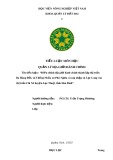
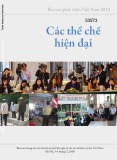


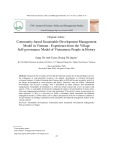

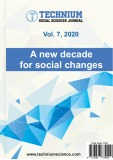
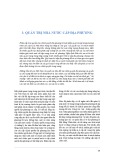

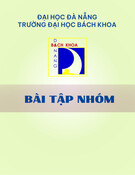
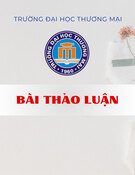





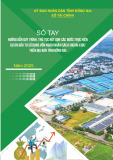

![Tài liệu Quản lý dự án: Kiến thức nền tảng toàn diện [chuẩn SEO]](https://cdn.tailieu.vn/images/document/thumbnail/2025/20250910/kimphuong1001/135x160/92631757496585.jpg)




